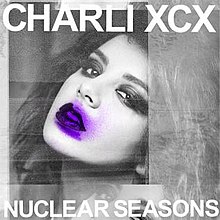Nuclear Seasons
| "Nuclear Seasons" | ||||
|---|---|---|---|---|
 |
||||
| Single by Charli XCX | ||||
| from the album True Romance | ||||
| Released | 20 November 2011 | |||
| Format | ||||
| Recorded | 2011 | |||
| Genre | ||||
| Length |
|
|||
| Label | ||||
| Writer(s) |
|
|||
| Producer(s) | Rechtshaid | |||
| Charli XCX singles chronology | ||||
|
||||
"Nuclear Seasons" is a song by British singer and songwriter Charli XCX taken from her debut extended play (EP), You're the One (2011), and was later included on her debut studio album, True Romance (2013). It was released as the EP's second single on 21 October 2011 through This Is Music, Atlantic, and Warner Music UK. "Nuclear Seasons" was written by Charli, Justin Raisen, and Ariel Rechtshaid, while the latter produced the song.
Musically, "Nuclear Seasons" is a slow-burning dark wave and synthpop song with low-lying synths, industrial textures, and a shadowy atmosphere. The album version of the song contains a minute-long intro (a sample of "Grins", another song appearing on True Romance) where Charli repeats the refrain "I want this forever." According to Peter Tabakis of Pretty Much Amazing, the song "forms the sonic and thematic outline for each song to come." The song's 80's-influenced vocal melody has been described as the centerpiece of its "lavish, if busy, production", which features flourishes of synths rings, electronic buzzes, and pattering and crashing beats. Lyrically, "Nuclear Seasons" compares taking shelter from the "literal and figurative fallout of a breakup" to surviving a nuclear fallout. Its lyrics speak of things such as burning cars and falling through the clouds, which according to Art Ivan of Tiny Mix Tapes, depicts what a rapture would look and sound like. In an interview with Rolling Stone XCX stated the song "reflects a state of cultural decay." Charli specifically notes what she sees as a decay in youth culture, stating "I don't feel like there's anything for people to really grab onto these days. There's no movement to speak of." While reviewing True Romance, Kevin Liedel of Slant Magazine called the song a "K-pop-esque opus" which showed one of only a few moments of genuine spontaneity.
...
Wikipedia
